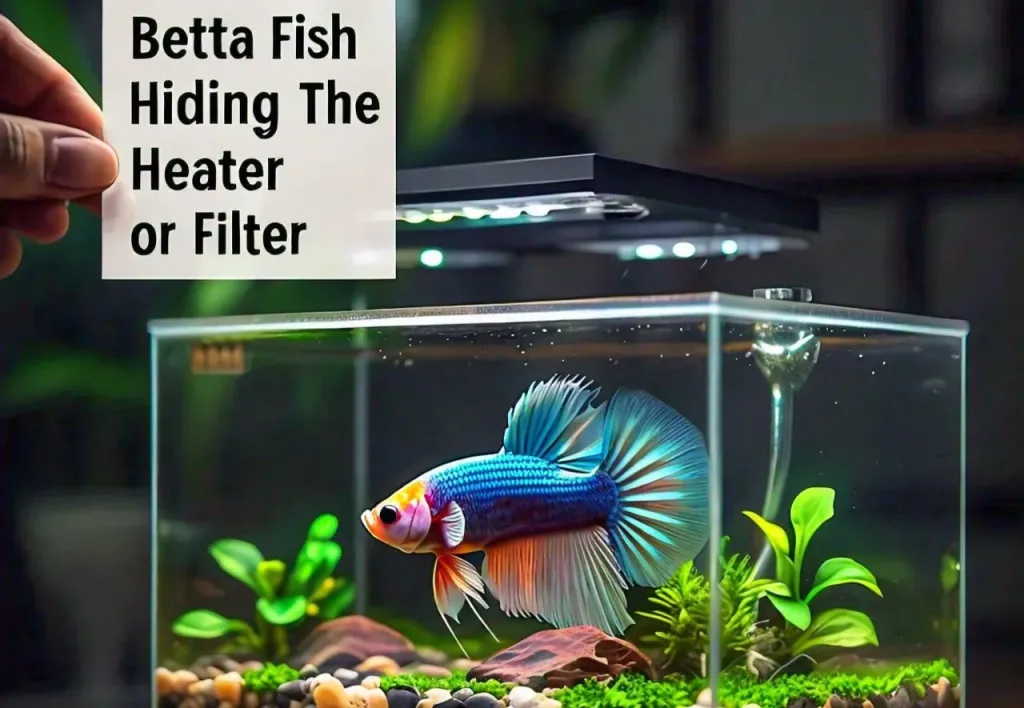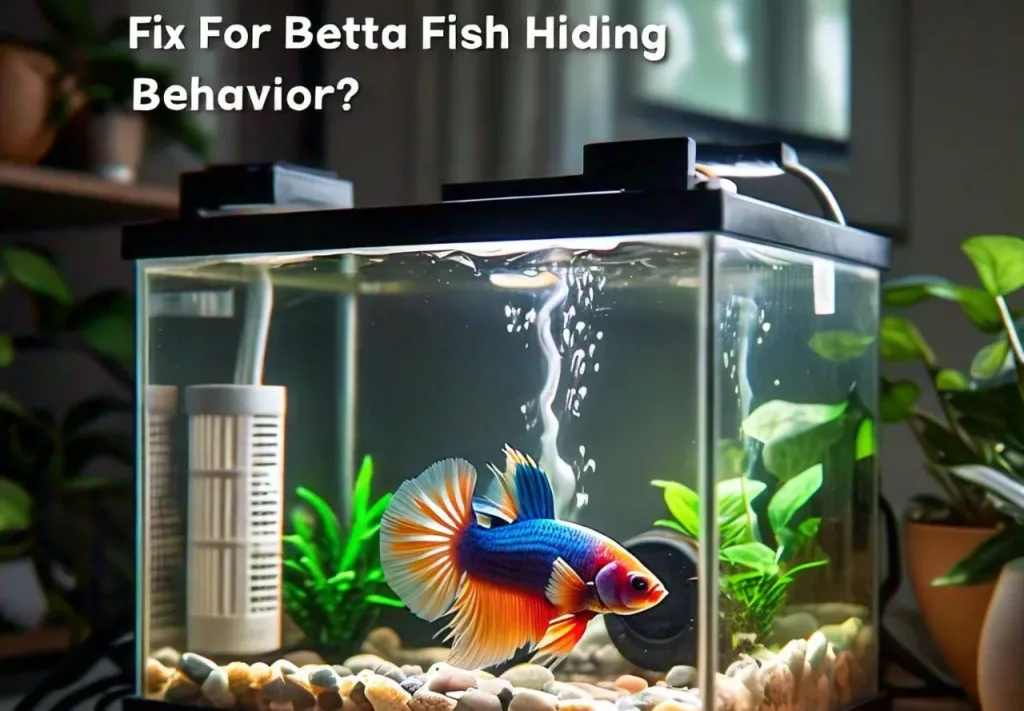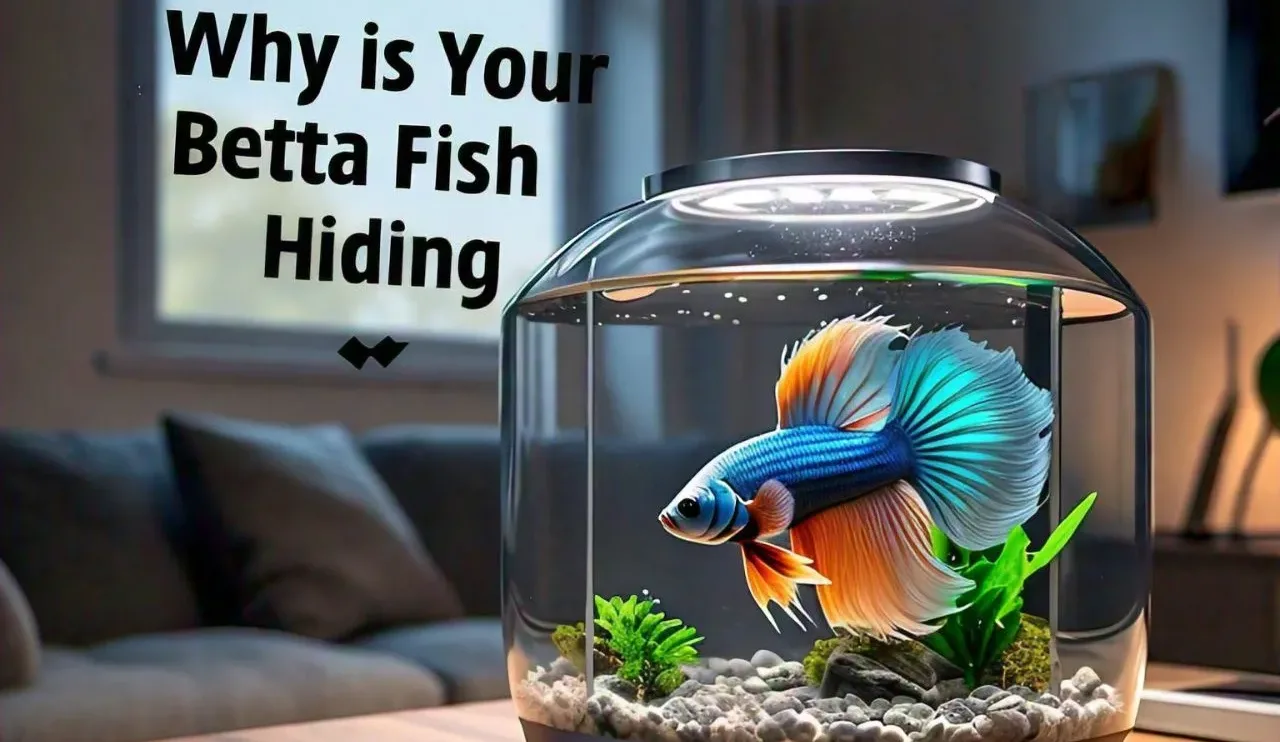If you’ve noticed your betta spending more time in seclusion, it’s important to understand why. Several common reasons for this behavior include stress, illness, or environmental changes. In this article, we’ll explore why your betta fish keep hiding and provide straightforward tips on ensuring they feel comfortable and secure again
Top Reasons That Cause a Betta Fish to Hide
Poor Water Quality:
- High amounts of ammonia and nitrite can hurt Betta fish.
- If the water is too acidic it can stress the fish out and cause health problems.
- Tap water often has chlorine and chloramine, which can harm fish.
Loud Noise:
They are sensitive creatures that can get stressed and scared when exposed to loud sounds.
Aggressive Tank Mate:
If another fish in the tank is aggressive and bothers the Betta, it can cause stress and make the Betta hide.
Sickness
If your Betta fish is sick, This might make them hide.
New Tank Environment
When you first put them in a new tank, they might feel scared or unsure because everything is different.
Injured Betta Fish
If a Betta fish gets hurt, it might hide because it feels scared or in pain. Common injuries happen from sharp objects in the tank or fights with other fish. Here’s how you can help:
1: Take out sharp things from the tank.
2: Keep the water clean to stop infections.
3: Add some aquarium salt to help healing.
4: Move the hurt fish to another tank if other fish are hurting it.
Watch your Betta fish for signs of injury and stress to keep them safe and happy
Why is My Betta Fish Hiding By The Heater or Filter

A betta hiding by the heater or filter could also signal that the water temperature is not ideal. Betta fish are tropical creatures and thrive in water around 75-80°F (24-27°C). If the water is too cold, they may cluster near the heater for warmth. On the flip side, if the water is too warm or there’s a problem with oxygen levels, they may stay near the filter where there is more water movement and oxygenation.
Why is My Betta Fish Hiding Under Rock?
A betta hiding under a rock or in the corners of the tank might be bored or feel insecure. Providing plenty of plants, caves, or decorations can give them more places to explore and hide comfortably, reducing stress.
Betta Fish Like to Hide? How to Make a Hiding Place
Yes, Betta fish like to have places where they can hide. Even though they look colorful and active, Betta fish are solitary animals that need spots to feel safe and reduce stress.
Here’s a quick guide to making hiding spots for your betta:
- Plants – Use soft, live, or fake plants for your betta to swim through.
- Small Cave – Buy aquarium caves or decorations with smooth holes.
- Rocks – Stack smooth, stable rocks to form caves or tunnels.
- PVC Pipes – Use clean, smooth-edged pipes for tunnels.
- Coconut Shell – Cut, clean, and smooth a coconut shell for a natural cave.
Make sure all items are smooth and safe for your betta!
Fix For Betta’s hiding Behavior

Here are some simple tips to help your Betta fish feel comfortable and happy:
Provide Places to Hide
Bettas like having plants and decorations in their tank where they can hide when they want to feel safe.
Keep the Water Clean
Change some of the water in the tank regularly to keep it clean.
Use Gentle Lighting
Bettas prefer softer light, so avoid very bright lights that might bother them.
Keep Things Quiet
Try to keep the area around the tank calm and quiet. Loud noises and sudden movements can stress out your Betta.
Choose Peaceful Tank Mates
If you have other fish in the tank, make sure they are calm and won’t bother your Betta.
Watch for Signs of Illness
Keep an eye on your Betta for any changes in behavior or appearance that might mean they are sick.
These tips can help your Betta fish feel more relaxed and happy in their home!
FAQs
- Do All Betta Fish Hide Under Their Plants?
Not all betta fish hide under plants, but many do because it makes them feel secure. Bettas are naturally inclined to seek cover to feel safe from potential threats.
- Why is my betta fish not as active?
Your betta fish might be inactive due to:
Water Quality:
Temperature:
Diet:
Health
Age
If the problem continues, consult a vet who specializes in fish
- Why Is My Betta Not Eating And Hiding All Day?
If your betta is not eating and hiding all day, it could be due to:
Stress: Changes in the environment, new tank mates, or loud noises can stress your betta.
Illness: Common betta illnesses include fin rot, ich, and swim bladder disease.
Poor Water Quality: High ammonia or nitrite levels can make bettas sick.
Temperature Issues: Bettas thrive in water temperatures between 76-82°F (24-28°C).
- Why Is My Betta Fish Staying Still in the Top Corner of the Tank?
Betta fish might stay in the top corner of the tank because:
Oxygen: They may need more oxygen from the surface.
Warmth: The water at the top might be warmer.
Stress: They might feel stressed or scared.
Resting: They often rest near the top to breathe easily.
Ensure the tank has good aeration, the right temperature, and a calm environment to keep your betta comfortable.
Conclusion
Betta fish often hide due to stress, illness, environmental factors, or simply their natural behavior. To ensure your Betta feels secure, maintain optimal water quality, provide hiding spots like plants or caves, and avoid loud noises or aggressive tank mates. Always monitor their behavior for signs of stress or illness and take action if needed. Creating a safe and comfortable environment will help your Betta thrive and stay happy.
